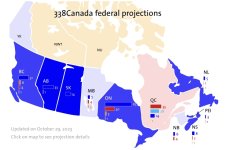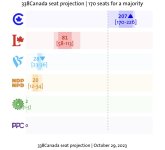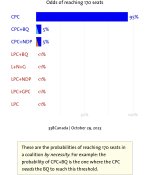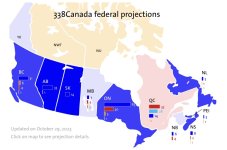The federal Liberals have undermined their highest environmental priority, the carbon tax, because they simply cannot afford to lose their Atlantic base.

For three decades, voters in the Maritimes and in Newfoundland and Labrador have mostly stood by the Liberal Party. One important exception came in 1996, when prime minister Jean Chrétien’s government tightened eligibility requirements for unemployment insurance – a vital social program for the region’s seasonal economy. Atlantic voters hammered the Liberals in the following election, costing them 20 seats.
Prime Minister Justin Trudeau appears determined to prevent something similar from happening to him. There are only 32 seats in Atlantic Canada. Even so, the region is disproportionately represented in the House of Commons, since it accounts for less than 7 per cent of Canada’s population, but has just under 10 per cent of the seats in the legislature.
In the three elections won by prime minister Stephen Harper’s Conservatives, the Liberals fared relatively well in Atlantic Canada. In every election on Mr. Trudeau’s watch, they have won a large majority of the seats in the region. (In 2015, they won them all.)

But after the Liberals brought Atlantic Canada fully into the carbon pricing system in July, because provincial plans no longer met federal standards, polls showed support for the party in the region cratering. The 338Canada.com compendium of polls projects that the Conservatives would likely win more seats than the Liberals in Nova Scotia and New Brunswick if an election were held today.

The Liberal Atlantic caucus pushed Mr. Trudeau hard for relief from carbon pricing. They succeeded. On Thursday, the government announced measures that included exempting home heating oil, which is pretty much used only in Atlantic Canada, from the carbon tax.

No doubt you’ve heard the rejoinder from federal Rural Economic Development Minister Gudie Hutchings to Western complaints about the cave-in for Atlantic Canada: “Perhaps they need to elect more Liberals in the Prairies.”

 apple.news
apple.news

For three decades, voters in the Maritimes and in Newfoundland and Labrador have mostly stood by the Liberal Party. One important exception came in 1996, when prime minister Jean Chrétien’s government tightened eligibility requirements for unemployment insurance – a vital social program for the region’s seasonal economy. Atlantic voters hammered the Liberals in the following election, costing them 20 seats.
Prime Minister Justin Trudeau appears determined to prevent something similar from happening to him. There are only 32 seats in Atlantic Canada. Even so, the region is disproportionately represented in the House of Commons, since it accounts for less than 7 per cent of Canada’s population, but has just under 10 per cent of the seats in the legislature.
In the three elections won by prime minister Stephen Harper’s Conservatives, the Liberals fared relatively well in Atlantic Canada. In every election on Mr. Trudeau’s watch, they have won a large majority of the seats in the region. (In 2015, they won them all.)

But after the Liberals brought Atlantic Canada fully into the carbon pricing system in July, because provincial plans no longer met federal standards, polls showed support for the party in the region cratering. The 338Canada.com compendium of polls projects that the Conservatives would likely win more seats than the Liberals in Nova Scotia and New Brunswick if an election were held today.

The Liberal Atlantic caucus pushed Mr. Trudeau hard for relief from carbon pricing. They succeeded. On Thursday, the government announced measures that included exempting home heating oil, which is pretty much used only in Atlantic Canada, from the carbon tax.

No doubt you’ve heard the rejoinder from federal Rural Economic Development Minister Gudie Hutchings to Western complaints about the cave-in for Atlantic Canada: “Perhaps they need to elect more Liberals in the Prairies.”
Trudeau’s Atlantic carbon tax exemption may be a fatal miscalculation — The Globe and Mail
The Liberal Party wanted to shore up support in the Maritimes, but the prime minister’s concession might cost him support in other areas





